
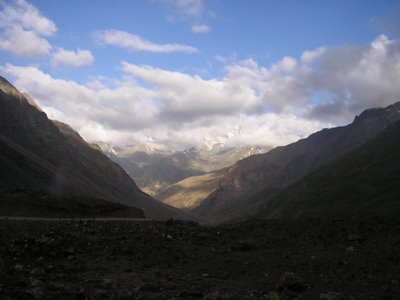

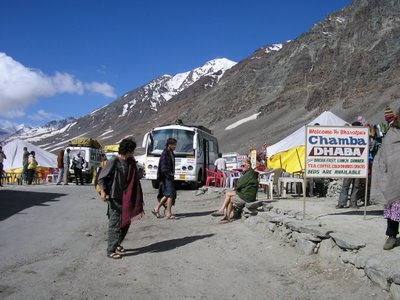
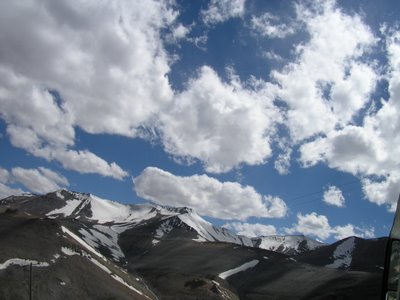
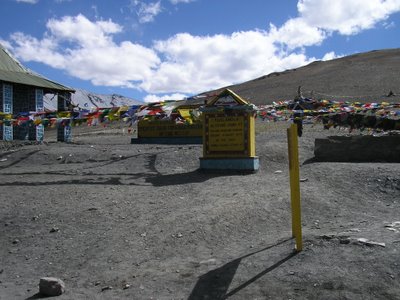
The bus ride the next day was an incessant climb. After a while we found ourselves so high that we even left the tall conifers behind. Stray grasses and beautiful violet, yellow and pink flowers were all we had for company. They tried their best to hide the stark naked mountains that boldly stared back at us. Even the sky had some how changed. Perhaps we were scared to look at the mountains that we perpetually stared at the blue bedsheet sky and watercolor clouds. We were completely at their mercy now. A little stream called Chandra, joined forces with another called Bhaga and formed a bigger stream called Chandrabhaga. Closeby, we camped for the night in a place called Keylong. Keylong had many narrow alleys. People huddled together now - there were so few people around.
Early next morning we left planet earth and landed on the moon. Moon rocks surrounded us and it was awfully cold. There was so little oxygen in the air and we wondered why we hadn't brought our spacesuits. We drank lots of water and hoped we would survive the ascent. First came Baralacha-La Pass (16060 ft), then the dizzy Tunglang-La Pass (17780 ft) until we finally descended to the relative security of Leh (10800 ft). Everybody had suddenly fallen silent. The Indian family that was traveling with us felt certain they would not survive this. The middle-aged British tourist muttered he hadn't seen anything as beautiful - not even in Iceland. The Frenchman frantically took pictures of everything he saw. I was not in the bus. I had left my body behind and become a cloud in the sky.
Pang is a place between Baralacha-La Pass and Tunglang-La Pass. There was a river that once flowed here. It had etched out a gorge that gave this eeriness to the scenery.
Pang
Faces writhed in pain,
Suffer in silence the agonies,
Of human inquisitiveness.
Sunburnt to a distant brown,
They are earthy memories,
Cloaked in sandy forgetfulness,
That stare heavenward,
At the flippant puffs,
Of the cold uncaring sky.
Streams of crystal tears,
Caress tough stones below,
As they drip down,
Along the etched destiny,
Of this human terrain.
On these faces,
Like a whirling dust,
Appears the phantom,
Of a naked ascetic,
That leaves his footprint,
On the ancient sand.
He turns to look,
His face a smile,
Of cruel apathy.
At once those faces,
Turn to him.
A heart-rending cry,
Beseeching sympathy.
And yet he walks on,
And sees in this pain,
Some unknown beauty.

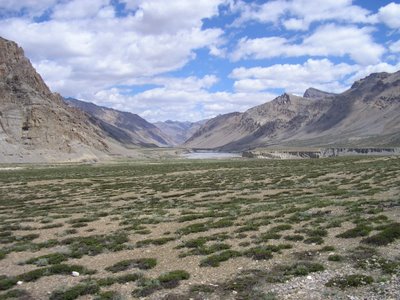

6 comments:
I am overwhelmed and can't think of anything to say.
The only comparison to my own life would be trekking up Mt. Washington in New Hampshire, the highest mountain in the Eastern US, and it's only 6000 or so ft. I really need to start travelling around your neck of the woods. ^_^
Thank you for your visit to my page and your comment. Free - flow is something I've wanted, so maybe I'm there now - at least sometimes!
Your poetry fascinates me with its sparseness and depth.
Oh Wow!
The first one, right on the top, has me drooling all over. awww! Theres something absolutely enchanting abt vast blank spaces, thats at once inspiring and extremely soothing!
Chloe:
They say pain is the strongest emotion we can have. That it should evoke fear and pity is normal, that it is sometimes associated with beauty is a revelation to me.
Vasu:
And thats your excuse for not saying anything :-)
Eric:
The Himalayas are pretty high. Ladakh however is in the Karakoram ranges, beyond the Himalayas, bordering China. I did some trekking in the Rockies at Colorado earlier this year - went up to 12000 feet I think. It was really beautiful.
Tumblewords:
Thank you so much. I finf Free-flowing so unwestern (if I may use the term). I find my friends in the West always in a hurry, living their lives by their clock.
I like your writing very much.
Velu:
Exactly what people say about Ladakh :-)
cool
Post a Comment